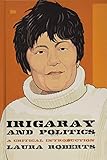Irigaray and Politics : A Critical Introduction / Laura Roberts.
Material type: TextSeries: Thinking Politics : THPOPublisher: Edinburgh : Edinburgh University Press, [2022]Copyright date: ©2019Description: 1 online resource (224 p.)Content type:
TextSeries: Thinking Politics : THPOPublisher: Edinburgh : Edinburgh University Press, [2022]Copyright date: ©2019Description: 1 online resource (224 p.)Content type: - 9781474422819
- 9781474422833
- B2430.I74 R63 2019
- online - DeGruyter
| Item type | Current library | Call number | URL | Status | Notes | Barcode | |
|---|---|---|---|---|---|---|---|
 eBook
eBook
|
Biblioteca "Angelicum" Pont. Univ. S.Tommaso d'Aquino Nuvola online | online - DeGruyter (Browse shelf(Opens below)) | Online access | Not for loan (Accesso limitato) | Accesso per gli utenti autorizzati / Access for authorized users | (dgr)9781474422833 |
Browsing Biblioteca "Angelicum" Pont. Univ. S.Tommaso d'Aquino shelves, Shelving location: Nuvola online Close shelf browser (Hides shelf browser)

|

|

|

|

|

|

|
||
| online - DeGruyter British Multiculturalism and the Politics of Representation / | online - DeGruyter Speculative Realism and Science Fiction / | online - DeGruyter A Guide to Ethics and Moral Philosophy / | online - DeGruyter Irigaray and Politics : A Critical Introduction / | online - DeGruyter Adam Smith and Rousseau : Ethics, Politics, Economics / | online - DeGruyter Raymond Bellour : Cinema and the Moving Image / | online - DeGruyter Interpassivity : The Aesthetics of Delegated Enjoyment / |
Frontmatter -- Contents -- Acknowledgements -- Introduction -- 1 Beyond Freud and Lacan -- 2 Feminine Imaginaries -- 3 Genealogies and Subjectivity -- 4 Irigaray’s Dialectics -- 5 Luce Irigaray with Gayatri Spivak -- 6 A Politics of Proximity -- Conclusion -- Afterword -- Bibliography -- Index
restricted access online access with authorization star
http://purl.org/coar/access_right/c_16ec
Positions Luce Irigaray as one of the most important and radical political thinkers alive todayProvides an overview of Irigaray’s broader psychoanalytic and philosophical contexts that have not as yet been acknowledged, giving important context for engaging with her more recent writingsSituates Luce Irigaray as a political philosopher, helping us to fully appreciate her political project and her challenge to western modernity and rationalityConnects the political, ethical and ontological aspects of Irigaray’s, bringing the concrete political features of Irigaray’s philosophy of sexuate difference to the foreEngages with the intersections of race, class and coloniality in Irigaray’s work and connects it to decolonial thinkers more broadlyBringing together Luce Irigaray’s early psychoanalytically orientated writings with her more recent and more explicitly political writings, Irigaray and Politics weaves together the ontological, political and ethical dimensions of Irigaray’s philosophy of sexuate difference in imaginative ways. Laura Roberts argues that Irigaray’s philosophical–political project must be read as a critique of constructions of western modernity and rationality. When appreciated in this way, it becomes clear how Irigaray’s thought makes profound interventions into contemporary political movements and decolonial thought – themes that have never been covered before in Irigaray scholarship. This enables readers to recognise that the question of sexual difference in Irigaray’s philosophy is concerned not only with refiguring politics and political action, but with the foundational structures that govern existence itself.
Mode of access: Internet via World Wide Web.
In English.
Description based on online resource; title from PDF title page (publisher's Web site, viewed 29. Jun 2022)


